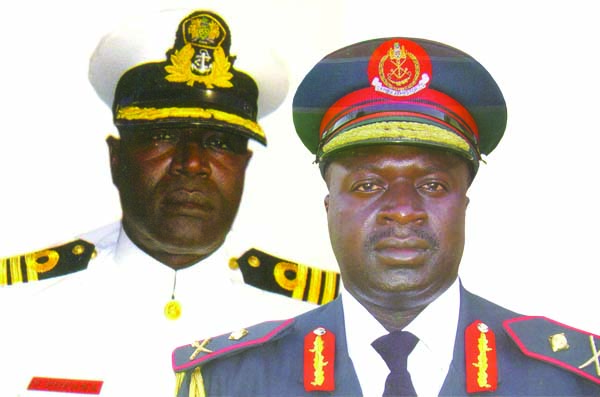
The trial on four counts of treasonable offences preferred against the former chief of defence staff of the
Yesterday’s proceedings saw the testimonies of two prosecution witnesses: Lamin Manneh, a security officer, amd Muhammded Sowe, a police officer, attached to the Major Crime Unit.
Tamba and Fofana are facing charges of conspiracy to commit treason, concealment of treason and treason. They were indicted by state prosecutors in connection with the 21st March 2006 abortive coup attempt, allegedly masterminded by ex-CDS Colonel Ndure Cham. Both denied the charges.
Testifying earlier in a crowded courtroom, the prosecution’s second witness, Lamin Manneh, told the court that on 8th Febuary 2010 he obtained a cautionary statement from the 1st accused, Lang Tombong Tamba.
“I read the cautionary wordings to the accused in the English language, which he understood and signed in the presence of an independent witness, one Babucarr Khan who also signed the statement,” he told the court.
“The accused recorded his own statement and signed it, and the independent witness also signed the statement,” the witness further told the crowded courtroom.
The witness recognised the said statement in court, and the Deputy Director of Public Prosecutions, M. Abdullahi, applied to tender the said statement in court as an exhibit.
The court admitted the exhibit without any objection from the defence counsel, Sheriff M Tambedou and LK Mboge.
The third prosecution witness, Muhammed Sowe, a police officer, attached to the Major Crime Unit of the Gambia Police Force, also told the court that he recognised the 2nd accused, Sarjo Fofana.
“On the 28th April 2010, I was part of a panel of investigators at the National Interlligence Agency (NIA), where I was instructed to obtain a cautionary statement from the 2nd accused, which I did,” PW3 told the court.
“I cautioned him by asking for his particulars. Before that, I asked him whether he can write for himself, but he said I should write for him, which I did,” the police officer told the court.
He adduced that he read the cautionary wording to the 2nd accused in English, which he understood and signed, adding that the accused was speaking while he was recording the statement.
“After the recording, the accused demanded the statement from me, which he read until he was satisfied, and signed. I too endorsed the statement as the recorder,” officer Sowe told the court.
The state prosecutor again rose and applied to tender the said cautionary statement obtained from the 2nd accused as an exhibit. The court admitted the exhibit without any objection from the defence counsel.
Under cross-examination by defence counsel L.K Mboge, the witness admitted being part of a team of investigators.
“Can you tell the court the names of the members of the panel?” counsel Mboge asked.
DDPP Makailu rose and said he was objecting to the question on the grounds that in the interest of national security, the witness cannot disclose the names of the investigators, because investigations are ongoing.
Defence counsel L.K Mboge, in response, told the court that the DDPP could not give evidence from the bar, while the witness was in the dock.
“Counsel cannot give evidence on facts that are before the court,” Mboge argued.
DDPP again rose, and told the court that the prosecution had already laid the foundation in the case, and urged the court to disallow that question.
Justice Ikapla disallowed the question, and subsequently overruled the defence submission.
Counsel Mboge then went further to submit that the 1997 constitution has vested judicial powers in the court not to be subjected to control by any person or authority.
He then referred the court to section 120 of the constitution and its various chapters and paragraphs to further buttress his submission.
“The objection by the prosecution amounts to control and direction of the procedures in court,” Mboge submitted.
He further submitted that this witness is bound by law and procedures to answer any questions posed to him and, in the event he refuses to answer, the court can compel him to do so as provided for in the provision. He again went on to cite section 24 sub section 2 of the 1997 constitution to back his submission.
Counsel Mboge also told the court: “If the prosecution is concerned about national security, then the case should have been heard in chambers.”
“It is not sufficient for the prosecution to merely say that the case is still under investigations without any evidence to support that allegation,” Mboge added.
Mboge also cited the Evidence Act to further strengthen his submission, and urged the court to overrule the DDPP objection.
The case was then adjourned till 1st November 2010 for the DDPP to reply on points of law. Justice Ikpala also told the court that he would deliver his ruling on that day.

